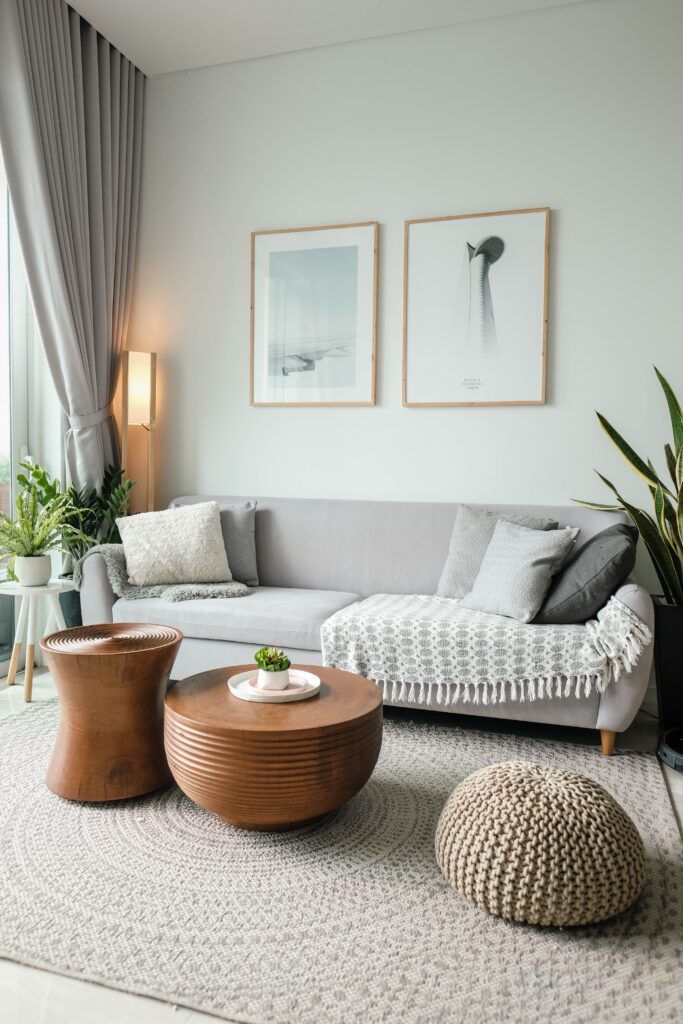Scandinavian decor, also known as Nordic decor, is a popular interior design style that originated in the 1950s in the five Nordic countries of Denmark, Finland, Iceland, Norway, and Sweden. It’s characterized by a minimal, clean aesthetic and a focus on functionality and comfort. If you’re considering incorporating Scandinavian decor into your home, here’s everything you need to know.
Key features of Scandinavian decor
One of the defining features of Scandinavian decor is its simplicity. This style favours clean lines and a minimalistic approach, focusing on functionality rather than clutter. This means that you’ll see a lot of unadorned surfaces and neutral colours, as well as an emphasis on natural materials like wood, stone, and wool.
Another key feature of Scandinavian decor is its emphasis on light. With long, dark winters in many parts of the Nordic region, Scandinavians have learned to make the most of natural light. You’ll often see large windows, light-coloured walls, and reflective surfaces like mirrors in Scandinavian homes, all designed to maximize the amount of light that enters the space.
Colour palette
One of the fundamental principles of Scandinavian decor is to create a sense of balance and harmony. This means that you should aim for a cohesive colour scheme that ties the different elements of your home together. You can do this by using a limited colour palette or by repeating colours throughout your home in different ways – for example, by using a particular shade of blue in your kitchen backsplash and a piece of art in your living room.
As mentioned, Scandinavian decor is known for its use of neutral colours. This doesn’t mean that every room has to be white, however. Soft pastels, light greys, and muted earth tones are all typical in Scandinavian decor, as are pops of brighter colours like sunny yellow and vibrant blue.
Textiles and materials
Textiles are an essential element of Scandinavian decor, and you’ll see a lot of natural materials like wool, cotton, and linen used in this style. These materials are often chosen for their comfort, durability, and natural, organic feel.
In terms of materials, wood is a central element of Scandinavian decor. You’ll see it used in everything from furniture to flooring to decorative accents. Other common materials in this style include metal, glass, and stone.
Furniture
Scandinavian furniture is known for its clean lines and functional design. You’ll often see pieces that are lightweight and easy to move, as well as those that serve multiple purposes – for example, a coffee table that doubles as storage.
One of the critical features of Scandinavian furniture is its versatility. Pieces are designed to be used in various settings, so you can mix and match them to suit your needs. This means that you don’t have to worry about finding exact matches for everything in your home – a little variety can add to the sense of cohesion in your space.
Lighting
Lighting is an essential element of Scandinavian decor, and you’ll often see a mix of natural and artificial light used in this style. Large windows, light-coloured walls, and reflective surfaces help to maximize the amount of natural light that enters a space, while pendant lights, table lamps, and floor lamps provide task and accent lighting.
In terms of lighting design, Scandinavians favour a practical, functional approach. You won’t see a lot of elaborate chandeliers or ornate lampshades in this style. Instead, you’ll see simple, modern fixtures that provide the light you need without drawing too much attention to themselves.
Conclusion
In conclusion, Scandinavian decor is a popular interior design style characterized by simplicity, functionality, and a focus on natural materials and light. It features a neutral colour palette, with pops of brighter colours and a mix of raw materials like wood, wool, and stone. Furniture is designed with clean lines and a focus on versatility, and lighting is practical and functional. Accessories and decor are kept to a minimum, emphasising functionality and a sense of warmth and comfort. If you’re considering incorporating Scandinavian decor into your home, remember to focus on creating a sense of balance and harmony and to let natural light and materials be the star

